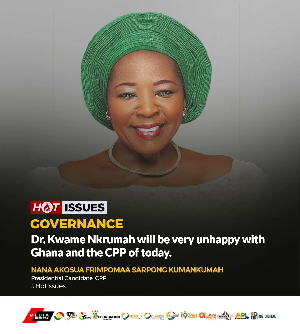



Nana Akosua Frimpomaa Sarpong, Chairperson of the Convention People's Party (CPP), has voiced her belief that Ghana’s first president, Dr. Kwame Nkrumah, would be disappointed with both the nation's progress and the state of the party he founded. Speaking in a recent interview, she emphasized that the 1966 coup d’état that ousted Nkrumah marked the derailment of his grand vision for the country's socio-economic transformation. According to her, this historic event not only halted Ghana’s development agenda but also led to the fragmentation and weakening of the CPP, which has struggled to regain its influence in Ghanaian politics.
Frimpomaa highlighted that Nkrumah's comprehensive development plans, which included the renowned seven-year development strategy, were designed to make Ghana self-reliant and an industrial powerhouse. However, she lamented that the current political leadership has failed to uphold these principles. Criticizing both the New Patriotic Party (NPP) and the National Democratic Congress (NDC), she noted that decades of governance by these two dominant parties have not delivered the development that Ghanaians deserve. She argued that if Nkrumah were alive, he would be deeply disappointed with the current state of affairs, particularly the lack of genuine progress toward economic independence and social equity.
Calling on Ghanaians to reflect on Nkrumah’s vision, Nana Frimpomaa urged the nation to re-evaluate its political choices and consider the CPP as a viable alternative to the duopoly that has dominated the political landscape. According to her, the CPP’s platform of self-reliance, industrialization, and social justice remains as relevant as ever, and she called for the youth, in particular, to rally behind the party to restore Nkrumah's ideals and complete the work he began.
Her statements have sparked conversations about the legacy of Nkrumah and the future of the CPP in Ghana’s ever-evolving political environment. Many share her sentiment that Ghana’s current development trajectory falls short of Nkrumah’s bold aspirations for the nation.